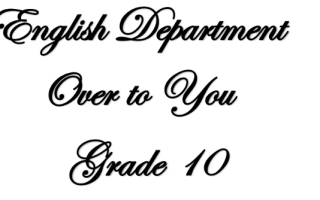أوراق عمل مراجعة عامة لغة انجليزية الصف العاشر الفصل الثاني 2021
Reading Comprehension Passage I
Read the following passage then answer the question below
Nelson Mandela was South Africa's first black president. He died on December 5, 2013 He was 95. Mandela was born in 1918. He was the son of a tribal chief At that time, most of Africa was under European rule. Mandela moved to Johannesburg in 1940. There, he did many things. He worked as a [X)liceman. He was also a boxer, and he studied law. In 1944, he started working against apartheid as a litical activist Apartheid laws kept people apart by race
In 1952, Mandela asked people to break laws that segregated schools, marriage, housing, and jobs. The government told Mandela to stop causing trouble. But Mandela did not follow the orders. In 1962, he was arrested. He was sent to prison for five years. A year later, police found that Mandela had been making plans against the government. In 1964, was found guilty of treason. He was sentenced to life in prison
Mandela called his years in jail the "long, lonely, wasted years." But while he was there, people around the world learned about apartheid. By the time, Mandela turned 70, he was famous. In 1989, F.W. de Klerk became the president of South Africa. De Klerk saw that the end of apartheid was near. He let Mandela out of prison. On February I l, 1990, Mandela went free. People across the country were filled with joy. Mandela became an icon of freedom
Mandela continued to work against apartheid. He shared the 1993 Nobel Peace Prize with de Klerk for his work. One year later, Mandela was voted president in South first all-race election. Mandela was president until 1999. He down at age 80. For many, Mandela's death was sad news. "We've lost our greatest son, " said South African President Jacob Zuma." Before his death, Mandela said: "l would like to be remembered not as anyone unique or special, but as part of a great team in this country that has struggled for many years, for decades and even centuries," he said. "The greatest glory of living lies not in never falling, but in rising every time you fall. "
A) Choose the correct answer from b. c and d
l- The main idea ofthe passage is:
a- The police in South Africa
b- South Africa's first black president
c- The 1993 Nobel Peace Prize
d- Africa under European rule
2- The underlined word" he" in the 2nd paragraph refers to
a- Mandela
b- police
c- treason
3- The underlined word order the 2nd paragraph means
a- Directions
b- Reasons
c- lessons
Readine Comnrehension Passage I
Read the following passage carefully. Then answer the question below
Most children in lx»or countries don't have enough food to eat. They don't have the fancy clothes, toys and other things that children of more deve101k countries have. Instead of going to school to gain a gocxl education, children in countries set out to work from as young as four or five years Old. By the age Of twelve, most of them are given the responsibilities Of looking after and sumx»rting their parents who are Often weak from hunger and ill health
Deprived Of any form of education from such a young age, these underprivileged children are forced to take up illegal odd jobs which often have hazardous and unsuitable working conditions. Since it is illegal for young children to work, the or factories that do hire these children hide them away from the main working areas. They trap children for long stretches of time in dark and dirty rooms. In India, for example, there are children who work in factories which manufacture matches. The working hours in these factories are long and the work is tedious, but what is most significant is that such factories are fire hazards. Not only do these children risk their lives by working, but they are also exploited as they are paid minimal wages
The United Nations encouraged countries to prohibit the import of products made by children under the age of 15. We may think such measures will stop the problem of child exnloitation, but the truth is they may lead to other problems. Even though the garment factories may be exploiting children by paying them low salaries, they do nevertheless provide them with a more or less safe working environment and proper jobs. Dismissing children from work does not necessarily mean that children will no longer work. In fact, they may end up in the hands of drug pushers or other criminals and lead a life of vice selling drugs or steal for a living
Summary Making 1
In Four sentences, explain what Carol Bergman thinks is important in preparing reading materials for black pupils
Helping black teenagers to read
There have been substantial Of black children in Britain's secondary schools for many years now, but most Of the reading material available to them is still directed at the white majority. Carol Bergman, a young American who taught remedial reading classes for the Inner London Education Authority from 1968 until last year, believe; that the lack Of material to directly to black students is part Of the reason many Of them need remedial reading at secondary level. TO solve this problem, she published books that the heroes are black to boost them to read. In addition, She suggested hiring the black in good positions there is much higher unemployment among black school-leavers than white. It doesn't help to lie about the fact that there is discrimination. In her opinion, black kids should learn to read side by side with the white. This will help them read and go on further education. They must be awarded if they deserve so
Summarv Making
In Four sentences Of your own summarize the following passage in answer to the following question
is coffee processed
The coffee plant, an evergreen shrub or small tree Of African origin, begins to produce fruit 3 or 4 years after being planted. The fruit is hand-gathered when it is fully ripe and a reddish purple in colour. The ripened fruits Of the coffee shrubs are processed where they are produced to separate the coffee seeds from their covering and from the pulp. Two different techniques are in use: a wet process and a dry process. The wet process First the fresh fruit is pulped by a pulping machine. Some pulp still clings to the coffee, however, and this residue is removed by fermentation in tanks. The few remaining traces Of pulp are then removed by washing. The coffee seeds are then dried to a moisture content of about 12 per cent either by exm)sure to the sun or by hot-air driers. If dried in the sun, they must be turned by hand several times a day for even drying




